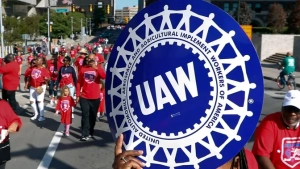NEWLY SPIRITED UAW LAYS OUT BARGAINING DEMANDS TO AUTO MAKERS

UAW is threatening to strike as early as Sept. 15 at any of the Big Three automakers if their contract demands are not met. (AP Photo/Paul Sancya/File / AP Images)
The Big Three auto manufacturers – GM, Ford and Stellantis (formerly Chrysler) are facing a different kind of union leadership as negotiations began on a new contract this year. With some of the old leaders now in jail, guilty of embezzling union funds and a referendum two years ago that mandated direct elections of the leadership, the auto giants are now confronted by a leadership with close ties to the rank-and-file members and a renewed determination to wage a strong fight for their interests.
“The UAW is back in the fight,” said newly elected President Shawn Fain, speaking for the new spirit in the union. as he delivered the UAW bargaining demands August 1. While speaking, he was framed by two images in the background. One displayed headlines from the previous week, when the Big Three reported their quarterly earnings, which included soaring profits. The other image detailed how UAW members have lost ground over the past two decades. For instance, current starting wages are $18.04, lower than the rate workers received in 2007, which amounted to $19.60 when adjusted for inflation.
“When you put these two images together, they paint a damning picture of what’s happening,” said Fain. “Not just in our industry but across the economy: the rich are getting richer while the rest of us are getting left behind.”
The current contract, a master agreement for the three auto companies large plants – GM’s Factory Zero Detroit-Hamtramck Assembly Center, Stellantis’s Sterling Heights Assembly plant and Ford’s Michigan Assembly Plant in Wayne – cover some 150,000 workers. It expires September 14.
Among the union’s negotiating priorities presented to the companies are: strong double-digit percentage increases in pay, ending a two-tier wage system, converting all temporary workers into permanent positions and placing strict limits on the future use of such workers, restoring cost of living allowances (COLA) and retiree health care benefits conceded by workers in the wake of the 2008 Great Recession, increasing pension benefits for current retirees as well as ensuring all workers receive defined-benefit pensions, and bolstering paid time off.
Fain compared the compensation of auto executives with that of auto workers. GM’s CEO Mary Barra drew compensation of $29 million last year while the starting pay at the GM joint venture Ultium Cells battery plant in Ohio gets only $16.50 an hour. “Our members are working sixty, seventy, even eighty hours a week just to make ends meet,” he said. “That’s not a living; it’s barely surviving, and it needs to stop.”
One of UAW’s big concerns are the new joint venture plants producing batteries for electric vehicles, which were not covered by the union’s contract with the Big Three and have much lower pay and benefits.
When one company, claiming that union demands would nor make it competitive, made an offer that wasn’t even in the same ball park with union proposals, Fain symbolically tossed it in the trash.
As the situation heats up with the threat of an industry strike pending and tensions rising, major parts of the American economy that supply the auto makers are holding their breaths. A strike could severely affect their businesses.
Stay tuned.


